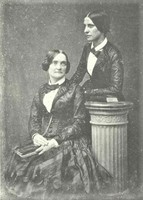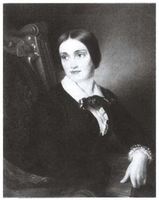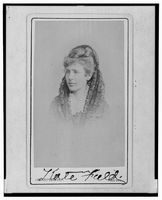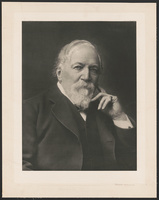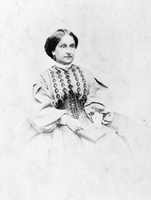Letter from Robert Browning to Isa Blagden, March 18, 1865
Dublin Core
Title
Letter from Robert Browning to Isa Blagden, March 18, 1865
Subject
Cushman, Charlotte Saunders, 1816-1876
Actors and Actresses--US American
Hays, Matilda Mary, 1820-1897
Gender Norms
Journalists/Writers
Criticism
Description
In a patronizing manner, Robert Browning speaks of the letter from March 3, 1865, which he received from Matilda Hays: "Miss Hays wrote to me for my signature to her petition for a literary pension: I thought it about the coolest proposal I remember, and told her plainly I would do no such thing: I will not ask for any such improper bestowment: (she had said, she did not rest her claims on her literary labours but on her work in behalf of women: and whatever be the worth of that, it is not literature."
Credit
Armstrong Browning Library - The Browning LettersCreator
Browning, Robert, 1812-1889
Source
Armstrong Browning Library, The Browning Letters, Digital Collection
Date
1865-03-18
Type
Reference
Letter Item Type Metadata
Text
[page 1] I am very sorry indeed to hear of Mrs Trollope’s illness—I suppose there is but one way, sooner or later, poor thing—& poor husband & child who love her so much. Give her & them the assurance of my truest sympathy. I hear of Lytton sometimes (met his father at dinner last week)—Louis Blanc told me he had just received a letter of 16 pages, written by his wife to his dictation, he being unwell: (she is about to make Sir E. a grandfather—which he, unnecessarily, assures his friends little gratifies him. I met a friend of yours, Miss Eden last night, at Lady Cowper’s,—promised to remember her most kindly to you: I had forgotten her face, but she said you brought her to call once. I am very glad you like my poems so much, dearest Isa, most have been written a long time ago—some were seen by Ba. I am about a long poem to be something remarkable—work at it hard. May it please you! Pen is quite well again: was 16. on the 9th ult. A great boy—or rather young man—I took him to a party last monday, and, woe’s me, he figured in coat and white tie! Good bye—dearest: how happy I shall be to see you in June, useless to say: it seems only too good to be true. Pen’s kindest love,—he is here with Willy B. Ever affectionately yours Robert Browning.
[page 2] -sation I meant to make him." I thought this so incredible, in the face of Cottrell’s account of the matter to me, that, after having written a letter to him, I delayed sending it till I could telegraph to Florence and know exactly when Mr Matthews had seen Giovanozzi: the answer returned was, "about Feb 4th"—nearly a month after Cottrell’s letter; so I posted mine; after which came the news of the illness—which I should be grieved if he fancied was known to me at the time of my application. About Giovanozzi I can have only one opinion. The irreparable mistake of Cottrell was to depart from the terms of the agreement—which were to pay one third of the price down—the second, when the work should be judged two thirds finished to the satisfaction of a competent artist, and the remainder only when the monument was erected: by paying the whole of the money before either of these last conditions was attended to, he placed me at the mercy of the man—who, no doubt, is not inclined to give up his hold in a hurry: what do you think of a fellow who having pocketed £240 [of] mine—quietly folds his arms and intends "not to begin" till I inform him what I mean to pay—as if I am to know by inspiration what he is wanting—or, if I knew it, am to [be] treated as if less worthy of trust than he! Since the payment of the above sum I see by Brini’s account that he has drawn on me for £4 more—I don’t in the least
[page 3] guess for what—and for aught I know he may help himself again. It is a great shame altogether: first, Leighton’s designs were impudently departed from: Cottrell thinks they left the sculptor a certain latitude: Leighton denies it, and appeals to the drawings themselves which were purposely made plain beyond the possibility of mistake: but be that as it may, even Cottrell acknowledges that there was a second departure even from those models—which nothing could justify: and here a protest ought to have been made, and certainly no money paid till the error was corrected. Of course all that is past is irrevocable: but I have written to implore Cottrell to get the man to finish his work at whatever cost: I am powerless and can only submit. However it will be in my power to give an account of the transaction in any English Journal I please, by the way of warning to others. My dearest Isa, can you be of any help to me, by quietly reminding Cottrell from time to time of the misery I undergo in this state of things? Why am I not as likely to be "at death’s door," and through it, with this work undone: I know your affection can move mountains. What a simple thing it would have been to say plainly at the beginning to this Giovanozzi—"Here are designs
[page 4] —will you copy them or not? Leave the care of all else to the artist that made, and the proprietor that will pay for them"! _________ I have hardly spirits enough to write about the many things that were in my head: I heard from Kate Field lately—a pleasant, but not remarkably wise letter—she is one of those disappointing people, from whose ordinary life & ways you expect something better when they shall set to work. I like her all the same, however. Jarves and his wife called on me a fortnight ago: she is nice, and he, poor fellow,—I was moved to the marrow by the sight of him! He looks thin,—his eyes more spectral than ever,—but well enough:—is now gone to Paris—but will return and settle in London for some time: he has passed evidently a wet sponge over the past, Mrs J. his daughters & all. Miss Hays wrote to me for my signature to her petition for a literary pension: I thought it about the coolest proposal I remember, and told her plainly I would do no such thing: I will not ask for any such improper bestowment: (she had said, she did not rest her claims on her literary labours but on her work in behalf of women: and whatever be the worth of that, it is not literature. She replied by sending the petition itself, in which among other grounds for claiming relief from Government she mentions—I will give you her own words—"Never strong, the strain of so arduous a part as Juliet to Miss Cushman’s Romeo, constantly repeated, brought on a condition of health which after a short time obliged me to give up the Stage altogether." Not knowing how to say anything at all agreeable, I have not replied to the letter, and shall let it alone—no matter what the disgust to Bessie Parkes, Emily Faithfull &c[.]
[page 2] -sation I meant to make him." I thought this so incredible, in the face of Cottrell’s account of the matter to me, that, after having written a letter to him, I delayed sending it till I could telegraph to Florence and know exactly when Mr Matthews had seen Giovanozzi: the answer returned was, "about Feb 4th"—nearly a month after Cottrell’s letter; so I posted mine; after which came the news of the illness—which I should be grieved if he fancied was known to me at the time of my application. About Giovanozzi I can have only one opinion. The irreparable mistake of Cottrell was to depart from the terms of the agreement—which were to pay one third of the price down—the second, when the work should be judged two thirds finished to the satisfaction of a competent artist, and the remainder only when the monument was erected: by paying the whole of the money before either of these last conditions was attended to, he placed me at the mercy of the man—who, no doubt, is not inclined to give up his hold in a hurry: what do you think of a fellow who having pocketed £240 [of] mine—quietly folds his arms and intends "not to begin" till I inform him what I mean to pay—as if I am to know by inspiration what he is wanting—or, if I knew it, am to [be] treated as if less worthy of trust than he! Since the payment of the above sum I see by Brini’s account that he has drawn on me for £4 more—I don’t in the least
[page 3] guess for what—and for aught I know he may help himself again. It is a great shame altogether: first, Leighton’s designs were impudently departed from: Cottrell thinks they left the sculptor a certain latitude: Leighton denies it, and appeals to the drawings themselves which were purposely made plain beyond the possibility of mistake: but be that as it may, even Cottrell acknowledges that there was a second departure even from those models—which nothing could justify: and here a protest ought to have been made, and certainly no money paid till the error was corrected. Of course all that is past is irrevocable: but I have written to implore Cottrell to get the man to finish his work at whatever cost: I am powerless and can only submit. However it will be in my power to give an account of the transaction in any English Journal I please, by the way of warning to others. My dearest Isa, can you be of any help to me, by quietly reminding Cottrell from time to time of the misery I undergo in this state of things? Why am I not as likely to be "at death’s door," and through it, with this work undone: I know your affection can move mountains. What a simple thing it would have been to say plainly at the beginning to this Giovanozzi—"Here are designs
[page 4] —will you copy them or not? Leave the care of all else to the artist that made, and the proprietor that will pay for them"! _________ I have hardly spirits enough to write about the many things that were in my head: I heard from Kate Field lately—a pleasant, but not remarkably wise letter—she is one of those disappointing people, from whose ordinary life & ways you expect something better when they shall set to work. I like her all the same, however. Jarves and his wife called on me a fortnight ago: she is nice, and he, poor fellow,—I was moved to the marrow by the sight of him! He looks thin,—his eyes more spectral than ever,—but well enough:—is now gone to Paris—but will return and settle in London for some time: he has passed evidently a wet sponge over the past, Mrs J. his daughters & all. Miss Hays wrote to me for my signature to her petition for a literary pension: I thought it about the coolest proposal I remember, and told her plainly I would do no such thing: I will not ask for any such improper bestowment: (she had said, she did not rest her claims on her literary labours but on her work in behalf of women: and whatever be the worth of that, it is not literature. She replied by sending the petition itself, in which among other grounds for claiming relief from Government she mentions—I will give you her own words—"Never strong, the strain of so arduous a part as Juliet to Miss Cushman’s Romeo, constantly repeated, brought on a condition of health which after a short time obliged me to give up the Stage altogether." Not knowing how to say anything at all agreeable, I have not replied to the letter, and shall let it alone—no matter what the disgust to Bessie Parkes, Emily Faithfull &c[.]
From
Browning, Robert, 1812-1889
To
Blagden, Isabella "Isa", 1816?-1873
Provenance
Social Bookmarking
Collection
Citation
Browning, Robert, 1812-1889, “Letter from Robert Browning to Isa Blagden, March 18, 1865,” Archival Gossip Collection, accessed July 3, 2024, https://archivalgossip.com/collection/items/show/608.



